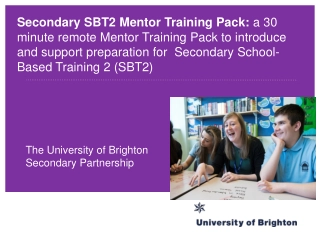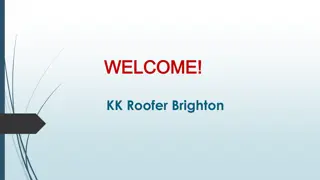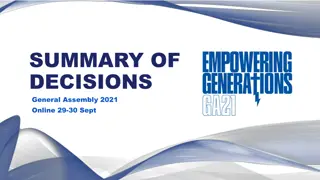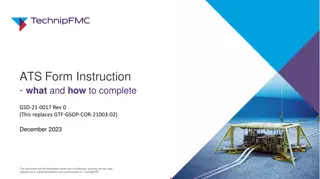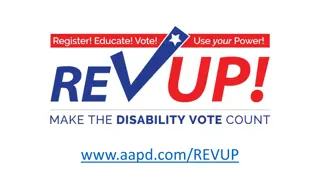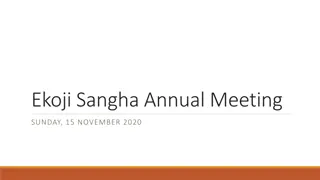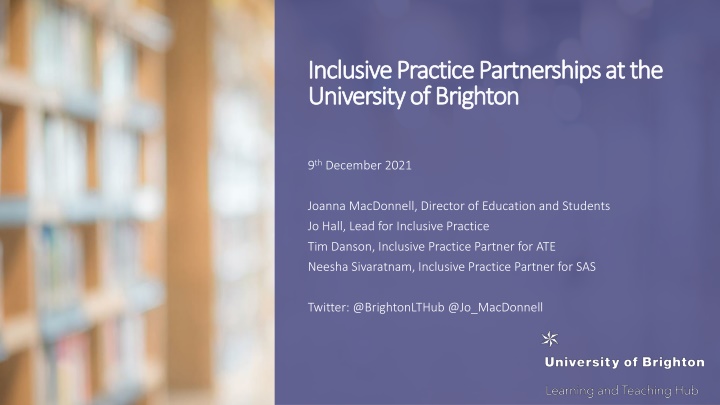
Building Inclusive Practice Partnerships at University of Brighton
The Inclusive Practice Partnerships at the University of Brighton aim to reduce differential outcomes for students, particularly focusing on Black, Asian, and minority ethnic students. Through research-informed interventions and actions since 2019, the scheme aims to develop an inclusive curriculum, increase student belonging, and promote well-being. Join the community of best practice for inclusive education.
Download Presentation

Please find below an Image/Link to download the presentation.
The content on the website is provided AS IS for your information and personal use only. It may not be sold, licensed, or shared on other websites without obtaining consent from the author. If you encounter any issues during the download, it is possible that the publisher has removed the file from their server.
You are allowed to download the files provided on this website for personal or commercial use, subject to the condition that they are used lawfully. All files are the property of their respective owners.
The content on the website is provided AS IS for your information and personal use only. It may not be sold, licensed, or shared on other websites without obtaining consent from the author.
E N D
Presentation Transcript
Inclusive Practice Partnerships at the Inclusive Practice Partnerships at the University of Brighton University of Brighton 9thDecember 2021 Joanna MacDonnell, Director of Education and Students Jo Hall, Lead for Inclusive Practice Tim Danson, Inclusive Practice Partner for ATE Neesha Sivaratnam, Inclusive Practice Partner for SAS Twitter: @BrightonLTHub @Jo_MacDonnell
The Inclusive Practice Partnerships Scheme oA five-year, funded commitment by the University to developing a more inclusive curriculum in partnership with students o Focus on reducing differential outcomes, particularly for our Black, Asian and minority ethnic UG students
Research informed intervention Research - to identify factors contributing to the British-Black, Asian and Minority Ethnic degree awarding gap from the perspective of the students that it impacts (Student Experience); Focus groups across all schools of study from April-May 2019; students were invited to discuss their student experience; 42 students across 13 focus groups; Eurocentric curriculum and tokenistic attempts at diversity; Reading lists and library provision;
Actions from 2019 -present Small scale pilot of Curriculum Advisors project established in 2 academic schools Strategic decision to develop the Curriculum Advisors scheme to follow established sector practice Project renamed - Inclusive Practice Partnerships Scheme. And to align with institutional policy and sector commitments #ClosingTheGap pledge Race Equality Charter Ethnicity Degree Awarding Targets Embedding the practice within taught modules with evidence to support evaluation Funded by the Access and Participation Plan institutional budget Key activity of the Brighton 2025 Strategic Plan
To reduce differential outcomes for students through development of an inclusive curriculum; Aims of the Inclusive Practice Partnerships Scheme (1) To increase students sense of belonging and to promote well-being at Brighton; To develop effective partnership working methodologies as part of an inclusive curriculum;
To develop a community of best practice, sharing resources and developing strategies for developing an inclusive curriculum; Aims of the Inclusive Practice Partnerships Scheme (2) To improve the representation of race equality in the curriculum (REC, aim 12; NUS, #ClosingtheGap, Pledge 3), through decolonising of curricula and pedagogic practices; To improve staff confidence in addressing issues of race inequality in teaching and learning (REC, aim 13 / NUS #ClosingtheGap, Pledge 3), through the decolonising of curricula and pedagogic practices.
o IPPs are employed to review curriculum content and / or teaching practices within their School on specific modules (not courses). How the Inclusive Practice Partnerships Scheme works o The focus for this review is the representation of racial, ethnic or cultural identities and their histories within teaching materials and curriculum content. o The aim is for IPP teams to make recommendations for diversifying or decolonising module content and pedagogic practices. oPartnership working is our key methodology
53 student Inclusive Practice Partners were recruited across all 13 Schools One academic lead in each School worked with the IPPs Year 1: 2020/21 Online and workshop training in both diversifying and decolonising the curriculum and partnership working 116 UG modules were initially selected for review
Following review, Inclusive Practice Partners made recommendations for changes to module content or delivery Recommendations Module leaders had facilitated discussions with IP teams Support to implement changes for 2021/22
Examples of recommendations Additions to reading lists (to diversify and globalise perspectives / authors) Subject specific unconscious bias training for students (and staff). Adjusting case studies to avoid perpetuating stereotypes and to actively challenge them. Additions to the curriculum that include issues of race equity, social justice, colonialism/post- colonialism, decolonising the curriculum. Suggestions to add context (geographical / historical) to case studies to provide insight. Greater diversity of racial, ethnic and cultural identities as represented in the curriculum (e.g. artists, film-makers, photographers, writers). Suggestions to include greater variety of racial, ethnic and cultural identities in explaining medical conditions (also pertinent to resources / images used).
Evaluation Aims to quantitatively and qualitatively investigate changes over time Baseline survey data for modules under review Module surveyed again after changes to the curriculum have been made
Evaluation focusing on: Students' attitudes and experiences of belonging and inclusion Students' attitudes and experiences of belonging and inclusion Students' attainment levels on IPP focused modules Students' attainment levels on IPP focused modules IPP s perceptions and experiences of working in partnership IP Leads experiences and perceptions of working in partnership
2020/21 Survey Black students do not feel represented (because the books used or lecturers teaching them are not of the same identity). The module is Eurocentric or Western. Most case studies in health relate to white participants including older and newer case studies. More relevant case studies are needed. Their ethnicity is perceived as related to immigrants in British education. They had a skin condition case in a workshop. All images showed patients with white skin, which limits understanding of skin conditions on other skin tones. Not being able to recognise this could have serious implications in practice. Ethnicity is not focused on in Engineering because of its technical focus. Historical science conducted by Black, Asian and Minority Ethnic scientists is not referred to. All work is based on white scientists.
2020/21 Survey Currently, there is little representation of other (than white) races or ethnicities in this discipline. All ethnicities should be represented equally. As a white British person, they want to learn about the games industry across different countries and cultures. The games module should not overly focus on Western genres. They feel overrepresented as most of the cohort are White British. Case studies mostly relate to White male research and do not refer enough to other ethnicities. There is a hierarchy of White males and a narrow representation of diverse ethnicities and backgrounds in academic literature. There is a need to include authors from varied race and gender backgrounds, through case studies, research, textbooks, articles and material that is not-only UK focused. Lecturers teaching language does not always reflect the power relations, and sometimes refers to stereotypes and deficit models inferred in phrases such as 'developing countries.'
64 student Inclusive Practice Partners recruited across all 8 Schools One academic lead in each School working with the IPPs, but also more involvement of module leaders Year 2: 2021/22 Online workshop training in both diversifying and decolonising the curriculum and partnership working and online resources
Year 2: Embedding diversifying and decolonising the curriculum into academic and quality processes through Periodic Review Students will work with course and module leaders in preparation for Periodic Review to look at two modules per Level Continuing to work within Schools to review modules Introduction of the Inclusive Practice Mark (for Diversifying, for Decolonising)

